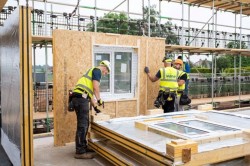Stewart Dalgarno, director of product development at Stewart Milne Timber Systems, discusses how Advanced Industrialised Methods for the Construction of Homes (AIMCH) can overcome many challenges currently faced by housebuilders and developers while providing fast, dependable solutions
Amid a rising population and growing numbers of households, the UK is undoubtedly experiencing a significant housing shortage that shows little sign of abating in 2020.
It’s arguably the most pressing domestic challenge facing the country – government statistics state that a further 120,000 homes are needed annually – yet while some progress has been made, the continued lack of supply requires radical solutions and innovative thinking.
The most specific shortage is in the provision of affordable homes and it’s clear that the rate at which additional homes need to be built cannot be achieved solely through traditional construction methods.
Forward-thinking approach
A more multifaceted, forward-thinking approach is therefore required to transform and modernise how tomorrow’s homes are built. Finding methods that combine speed, quality and efficiency in order to build affordable, high-quality, low carbon and efficient homes is a huge priority.
Among the most viable solutions – and we believe it to be a game-changer in terms of jobs, investment and growth – is the flagship three-year housing innovation project Advanced Industrialised Methods for the Construction of Homes (AIMCH), which aims to combat the UK housing crisis through a significant collaborative effort across a number of industry leaders.
This project is being managed by Limberger Associates, and includes Stewart Milne Group, Barratt Developments, London Quadrant Housing Trust, the Manufacturing Technology Centre, the Construction Scotland Innovation Centre and Forster Roofing Services.
Offsite construction and digital working
Through the increasingly popular methodology of offsite construction, digital working and lean site assembly, we believe that the sustainable, highly integrated construction approach offered by AIMCH represents a strong alternative to traditional construction methods.
It’s about thinking differently and embracing fresh concepts that can be quickly scaled up in order to effectively respond to demand for homes, skills shortages in the building industry and heightened environmental considerations.
Key among these concepts is offsite construction, which emphasises sustainability. Indeed, its ability to significantly increase the speed at which a home’s structure can be created reduces wastage and risk in a significantly more efficient and cost-effective manner.
The Innovation Consortium-led AIMCH is dedicated to a specific aim, however – of identifying and honing the industrialised offsite panelised methods that will help to meaningfully meet current and future housebuilding demands. These solutions are set to be trialled with the most successful being taken forward, commercialised and then brought to market.
Live construction data
With that in mind, data is currently being gathered from live construction sites in order to provide better insights, more informed decision-making and to aid business cases for change and investment across the industry.
AIMCH further seeks to advance digitally-integrated solutions in design standardisation, design for manufacture, supply chain integration, enhanced offsite panelised systems and lean construction processes. This is expected to further streamline the process.
Offsite panelised systems
Enhanced speed of build and de-risking the build process can be achieved through offsite panelised construction in a controlled environment, where there is the ability to produce large volumes of homes at pace and to exacting standards. This reduces overall build times, on-site disruption and waste, while producing increased flexibility and better value.
Taking an offsite panelised construction approach means there is also less reliance on on-site supervision during the key superstructure construction process. The faster build of the main structures meanwhile serves to de-risk the process.
Ultimately, the goal of AIMCH is to achieve marked savings and improve quality, cost-effectively delivering homes in volume, both reliably and quickly.
Impact 35,000 new homes
The opportunity is a significant one, as is the volume of homes that can be created. Indeed, the £6.5m AIMCH project has the potential to impact on up to 35,000 new UK homes annually, and Stewart Milne Group believes it’s a vital driver of the UK’s housing ambitions.
With valuable experience and expertise in all aspects of offsite panelised construction, specifically with the use of timber frame systems, Stewart Milne Group plays an integral role within AIMCH. As specialists in offsite construction, we develop high-performance timber systems, delivering noticeable benefits for our clients’ construction projects.
Offsite timber systems
Offsite timber systems represent an intelligent approach to building that tackle a number of modern construction challenges through precision engineering in an automated factory environment, with conditions that are optimum for manufacturing.
This reduces the margin for error and enables products of a consistently high standard, in turn ensuring that guaranteed performance standards are consistently met during the design and manufacturing process, matching the specification for each individual project – allowing for a seamless handover to follow-on trades as well as fewer ongoing maintenance requirements.
We believe that adopting such a “fabric first” approach will be essential to supporting the government’s planned introduction of a Future Homes Standard. This will require new build homes to be futureproofed with low carbon heating and world-leading levels of energy efficiency by 2025.
Against this backdrop, the sharing of ideas will take on fresh importance, and AIMCH will aim to foster a mindset where manufacturing advancements and leading offsite systems can be adopted by others within the housing sector for the creation of a collective knowledge base underpinned by digital design tools.
If we are to overcome the UK’s housing shortage with long-term solutions, then focused innovation frameworks such as AIMCH must be considered among the strongest strategic foundations on which the country can build.









